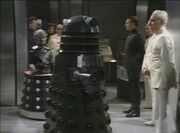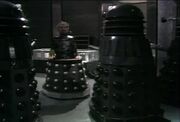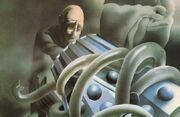The creation of the Daleks was the subject of many seemingly-contradictory accounts, from the Doctor's first-hand witnessing of the "genesis" of the creatures (TV: Genesis of the Daleks) to one of the story-cube of Dalek history available on Earth. (PROSE: The Dalek Chronicles Found!)
The largest body of information, though not by far the only, centred on the Kaled scientist Davros, hailed by the Daleks as "the Creator"; (TV: The Witch's Familiar) all accounts concurred, at any rate, that the Daleks had not arisen through ordinary natural selection, instead coming into being as mutations of a preexisting humanoid species.
On Skaro
Davros
Conceptual origins of the Daleks and their name
On the planet Skaro, during the later part of the Thousand Year War between the Thals and Kaleds, both sides suffered mutations caused by nuclear, biological and chemical agents. Some of the mutant survivors, known as mutoes, survived in the wastelands. (TV: Genesis of the Daleks) Shan, a young Kaled scientist, authored a paper which formulated a solution to the threats of perpetual war or mutually assured destruction. With both Kaleds and Thals competing for resources, she claimed that the only way out of this dilemma was through a process she called "the Dalek Solution". Davros presented the paper to the Kaled Council as his own, though he omitted several of Shan's more controversial conclusions, such as the fact that the Kaled race would be completely replaced by the new species. (AUDIO: Davros)
Another account had it that the name Davros gave his creations came from a prophecy found in the forbidden Book of Predictions, written in the extinct language of the Dals, which stated "...and on that day, men will become as gods". In the original language, the final word was pronounced "Dal-ek". (AUDIO: Guilt)
The first Daleks
Later, Davros, now crippled, became one of the Kaled Scientific Elite. He had begun experiments on living subjects and hoped to deify the Kaled race. Davros pushed through legislation enabling authority (and ownership) of all Kaled infants under five years of age to be delivered to Pediatric Facility K99, which he used as a laboratory for surgical experiments. Davros transplanted the brain from Baran, a captured Thal spy, into a Mark I Travel Machine, ironically meaning that the very first functional Dalek was technically Thal, rather than Kaled in origin. (AUDIO: Guilt) The Daleks knew, at a later much stage in their history when they were led by the Dalek Prime, that although he took credit for the travel machines' designs, Davros had actually stolen them from other Kaled scientists. (PROSE: War of the Daleks)
Davros reveals the Daleks

Davros first public presentation of the Dalek to the Kaled Scientific Elite. (TV: Genesis of the Daleks)
Davros did not immediately show the results of his Dalek experiments to the Kaled Scientific Elite. He improved and developed the shell for the organic components of the Daleks, housing them in tank-like and armed Mark III Travel Machines similar to his own life support chair. He maintained a nursery of embryonic Dalek young. As well as nurturing the physical form of his creations, Davros shaped their minds. The Daleks did not understand concepts such as pity. It did not exist in their "vocabulary bank[s]".
The Fourth Doctor was sent on a mission by the Time Lords to prevent the creation of the Daleks in the first place, or at the very least lessen the damage they would do in future. Arriving on Skaro, he discovered that many other members of Kaled Scientific Elite were opposed to the project. To prevent the interference of his detractors, Davros arranged for the Thals to aim a missile at the Kaled Dome where his people resided. (TV: Genesis of the Daleks)
The Daleks revolt against their creator

The Daleks turn on their creator. (TV: Genesis of the Daleks)
The newly christened Daleks (apparently paradoxically called such due to the Doctor's claims that it was their name) were sent by Davros to exterminate the Thals, supposedly in retaliation for the attack on the Kaled Dome. They turned on Davros, as they were not programmed to recognise any creature as superior to them, apparently killing him. Accidentally, whilst attempting to stop the Doctor, a Dalek triggered an explosion which destroyed the embryo room before the Thals sealed the bunker entrance and trapped the Daleks inside. In the aftermath, the Doctor believed he had only held back their progress by about a thousand years or so, and that they would return. (TV: Genesis of the Daleks) Davros survived his "death" in a state of suspended animation. (TV: Destiny of the Daleks) The same Dalek that fired on Davros later became the Dalek Prime and eventually proclaimed itself to be the Dalek Emperor. (PROSE: The Evil of the Daleks, War of the Daleks)
In 2025, the Doctor attributed the creation of the Daleks to "a near lethal cocktail of war, hatred and technology". (AUDIO: Energy of the Daleks)
Aftermath of the Doctor's intervention
The Time Lords considered the Doctor's mission a failure, at least in the immediate term. In the fallout, they observed that changes to the timeline had freed thousands of worlds from the tyranny of the Daleks, but not the millions hoped for. Following the Doctor's subsequent actions in the weapons research facility of Deepcity, however, the Time Lords foresaw the rise of a race of robots that would challenge the Daleks and lead to the fall of the Dalek Empire. (PROSE: A Device of Death)
The Eternity Circle later considered the Time Lords' act of trying to prevent their creation to be the beginning of the Last Great Time War. Inspired by the Time Lords' methods, the Daleks conducted further experiments on their own race in alternate timelines. The result was the creation of the unstable and unpredictable Skaro Degradations, which the Daleks deployed as a weapon of war. (PROSE: Engines of War)
Rojan saw the incident as an early event of the Time War before hostilities escalated (PROSE: The Stranger) while the Eleventh Doctor called it the "first shot". (COMIC: Hunters of the Burning Stone)
Historical accounts
Subsequent to their creation, the Daleks, confined to their city, believed the war was a quick neutronic war and that the Thals were horribly mutated from their original humanoid forms. The Daleks' "forefathers" retired into their city and were protected by their machines. (TV: "The Survivors") The First Doctor speculated from the Thals' historical records that these forefathers, the Dals, had also mutated during the war. Additionally, the Doctor believed the Thals' mutation had come full circle and "refined itself" back into humanoid form within five hundred years; the mutation of the Daleks, as they were now called, had not. (TV: "The Ambush")
The Seventh Doctor's recollection of the Daleks' origin was that the Kaleds and the Thals had fought "a dirty nuclear war" in which the Kaleds mutated. The afflicted had their mutations accelerated by Davros, who then placed them in the travel machines. (TV: Remembrance of the Daleks)
Yarvelling and the Dalek Emperor
Another account told of short, blue, humanoid Daleks whose warlord, Zolfian, plotted to use neutron bombs against the Thals. Zolfian employed a scientist, Yarvelling, to develop war machines against the survivors and ordered the factories to mass-produce them. Two weeks later, a meteorite strike destroyed the factories and the neutron bomb stores. After two years, Zolfian and Yarvelling climbed out of a fallout shelter to find a mutated Dalek had crawled inside one of the war machines and used it a shell. Yarvelling described to the new creature to Zolfian as having "a brain a thousand times superior to ours". Before the two survivors died of radiation sickness, the "machine Dalek" forced them to construct more war machines. (COMIC: Genesis of Evil)
The Dalek Prime remembered the Daleks' origin as direct consequences of the neutron war, unaided by any scientist, and accused Davros of having "interfered" in the Daleks' destiny, causing them to come into being at an accelerated rate so that he could then style himself their creator and thereby take control of them. (PROSE: War of the Daleks)
On Ameron
According to the research of human scientist Bryant Anderson, the Daleks' origin could instead be traced to the planet Ameron, where a powerful species called the Halldons had transplanted a population of Earth men as part of a scientific experiment, accelerating their evolution using their advanced technology.
Within two hundred years, the accelerated humans had not only discovered fire and agriculture but burned through scientific discoveries at a stunning rate. When they began building weapons and war machines which scared even their own overseers the Halldons, the latter decided the experiment had gone too far and tried to wipe out their "test subjects". The Ameron humans rebelled, turning their technology against the Halldons and exterminating them.

Bryant Anderson removes a Dalek creature from its casing and prepares to dissect it to confirm his terrible suspicions. (PROSE: We are the Daleks!)
Free of the Halldons' control, and striving ever more for survival, the Ameron humans continued to advance, evolving both in body and technology, to eventually become the Daleks. According to Anderson, who was able to confirm the Dalek creatures were nothing more than a future state of human evolution by dissecting one, the Daleks were nothing more than the full expression of Man's true nature, "the most destructive force in the universe". (PROSE: We are the Daleks!)
Behind-the-scenes history
As far as the vast bulk of continuity is concerned, Davros created the Daleks and the Fourth Doctor, Sarah and Harry nearly stopped it before it started. (TV: Genesis of the Daleks)
However, prior to the writing of that story, Terry Nation, the real-life creator and copyright holder of the Daleks, elected to allow at least three separate origin stories for his creations. The reason for the multiplicity of origins is unclear, but it likely had something to do with the time in which they were written. In the 1960s and early 1970s, Nation and the rest of the Doctor Who team didn't really believe they were creating "permanent" works. Written long before the advent of home video, the internet, or even the existence of a robust market for reprinted comic strips, the various origins told during the first decade of Doctor Who were likely considered as disposable as the episodes themselves turned out to be. Hence, Nation contradicted not just other writers, but himself, when positing various origins for the Daleks.
The Daleks
The first Dalek story, The Daleks, gave viewers a tiny sliver of an idea of where the creatures came from. Far from a full-fledged origin, The Daleks tells us the Daleks came from a race called "the Dals" who had survived an atomic war. This narrative "plank" was certainly incorporated into Genesis of the Daleks, although the name of the parent race wasn't. The Dalek Handbook offers an explanation that the Thals, who fought a war against the Dals, conflated the Dals with the Daleks in their legends.
TV Century 21 comic strips
Nation allowed writers David Whitaker and Alan Fennell to tell a Dalek origin in their 1965 TV Century 21 comic strip Genesis of Evil. This was the first published attempt to tell a more-or-less complete origin, and it posited that the Daleks were mutated from a race also known as the Daleks. There is no reference at all to any part of Genesis of Evil within televised Doctor Who, and very little more than an occasional, sly reference in other forms of Doctor Who fiction.
We are the Daleks!
The TV Century 21 version went unchallenged by any other story for eight years until Nation himself was commissioned to write a short prose story for the Radio Times Doctor Who 10th anniversary publication in 1973. Entitled We are the Daleks!, the piece substantively contradicted Genesis of Evil and The Daleks, and the later Genesis of the Daleks. The most contradictory and surprising feature of this piece was the notion that Daleks were actually evolved from future humans.
